3805 Health & Illness: Dementia Health Risk and Nursing Care
VerifiedAdded on 2022/11/15
|7
|1820
|147
Report
AI Summary
This report addresses dementia as a significant health risk for older adults, emphasizing the role of nursing interventions. It highlights dementia's impact on cognitive function, daily living, and overall well-being, with a focus on the target audience of nursing professionals in community care settings. The report discusses the implications of nursing care, including patient education, therapeutic associations, and the promotion of mental and physical health. It also covers specific interventions like stimulating activities and advocating for patient autonomy. The report concludes by emphasizing the need for personalized nursing care to improve the quality of life for individuals with dementia. References to relevant research and guidelines are included to support the analysis and recommendations, providing a comprehensive overview of the health risk and nursing considerations.

Running head: HEALTHCARE
Dementia- A health risk for older adults
Name of the Student
Name of the University
Author Note
Dementia- A health risk for older adults
Name of the Student
Name of the University
Author Note
Paraphrase This Document
Need a fresh take? Get an instant paraphrase of this document with our AI Paraphraser
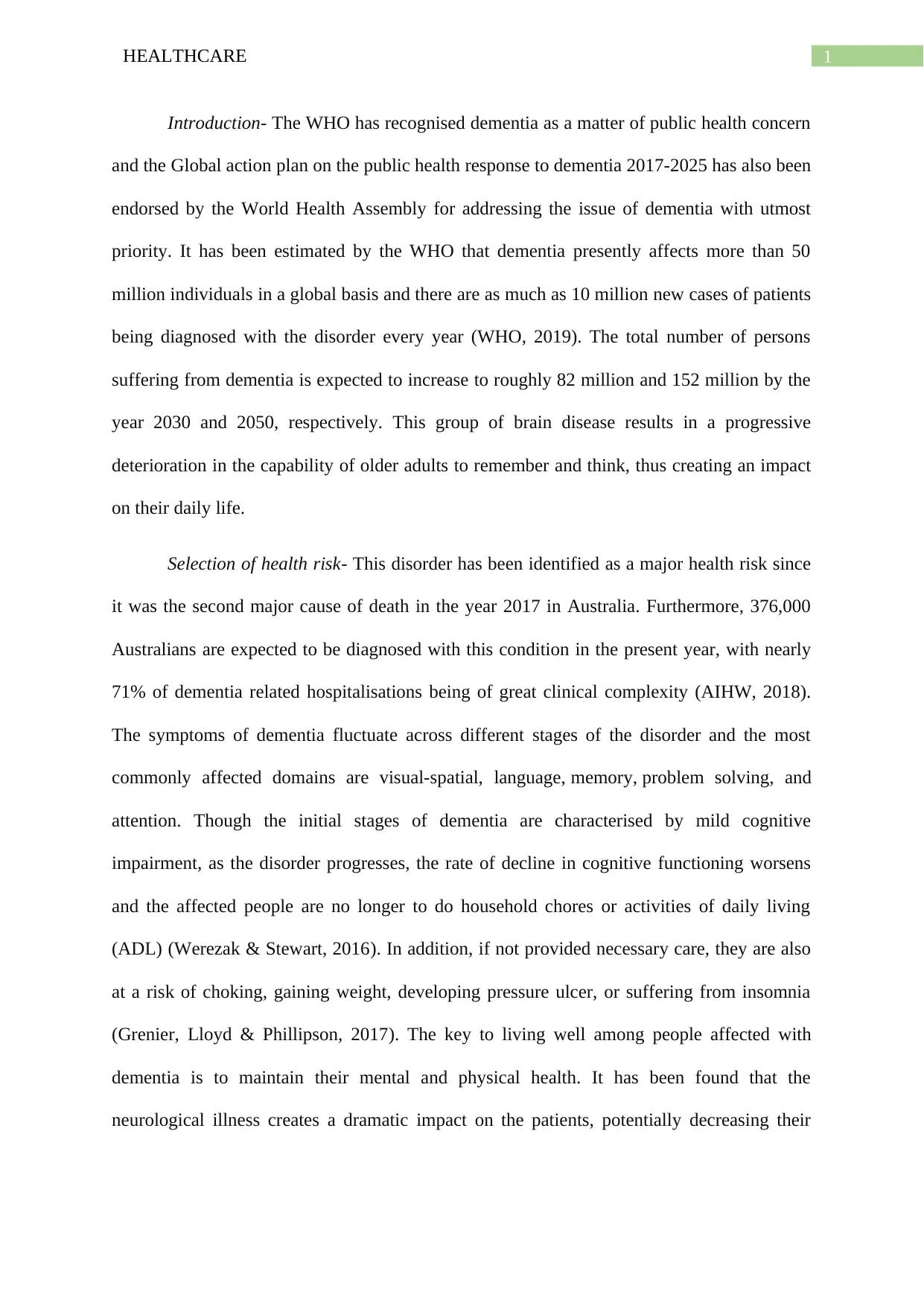
1HEALTHCARE
Introduction- The WHO has recognised dementia as a matter of public health concern
and the Global action plan on the public health response to dementia 2017-2025 has also been
endorsed by the World Health Assembly for addressing the issue of dementia with utmost
priority. It has been estimated by the WHO that dementia presently affects more than 50
million individuals in a global basis and there are as much as 10 million new cases of patients
being diagnosed with the disorder every year (WHO, 2019). The total number of persons
suffering from dementia is expected to increase to roughly 82 million and 152 million by the
year 2030 and 2050, respectively. This group of brain disease results in a progressive
deterioration in the capability of older adults to remember and think, thus creating an impact
on their daily life.
Selection of health risk- This disorder has been identified as a major health risk since
it was the second major cause of death in the year 2017 in Australia. Furthermore, 376,000
Australians are expected to be diagnosed with this condition in the present year, with nearly
71% of dementia related hospitalisations being of great clinical complexity (AIHW, 2018).
The symptoms of dementia fluctuate across different stages of the disorder and the most
commonly affected domains are visual-spatial, language, memory, problem solving, and
attention. Though the initial stages of dementia are characterised by mild cognitive
impairment, as the disorder progresses, the rate of decline in cognitive functioning worsens
and the affected people are no longer to do household chores or activities of daily living
(ADL) (Werezak & Stewart, 2016). In addition, if not provided necessary care, they are also
at a risk of choking, gaining weight, developing pressure ulcer, or suffering from insomnia
(Grenier, Lloyd & Phillipson, 2017). The key to living well among people affected with
dementia is to maintain their mental and physical health. It has been found that the
neurological illness creates a dramatic impact on the patients, potentially decreasing their
Introduction- The WHO has recognised dementia as a matter of public health concern
and the Global action plan on the public health response to dementia 2017-2025 has also been
endorsed by the World Health Assembly for addressing the issue of dementia with utmost
priority. It has been estimated by the WHO that dementia presently affects more than 50
million individuals in a global basis and there are as much as 10 million new cases of patients
being diagnosed with the disorder every year (WHO, 2019). The total number of persons
suffering from dementia is expected to increase to roughly 82 million and 152 million by the
year 2030 and 2050, respectively. This group of brain disease results in a progressive
deterioration in the capability of older adults to remember and think, thus creating an impact
on their daily life.
Selection of health risk- This disorder has been identified as a major health risk since
it was the second major cause of death in the year 2017 in Australia. Furthermore, 376,000
Australians are expected to be diagnosed with this condition in the present year, with nearly
71% of dementia related hospitalisations being of great clinical complexity (AIHW, 2018).
The symptoms of dementia fluctuate across different stages of the disorder and the most
commonly affected domains are visual-spatial, language, memory, problem solving, and
attention. Though the initial stages of dementia are characterised by mild cognitive
impairment, as the disorder progresses, the rate of decline in cognitive functioning worsens
and the affected people are no longer to do household chores or activities of daily living
(ADL) (Werezak & Stewart, 2016). In addition, if not provided necessary care, they are also
at a risk of choking, gaining weight, developing pressure ulcer, or suffering from insomnia
(Grenier, Lloyd & Phillipson, 2017). The key to living well among people affected with
dementia is to maintain their mental and physical health. It has been found that the
neurological illness creates a dramatic impact on the patients, potentially decreasing their
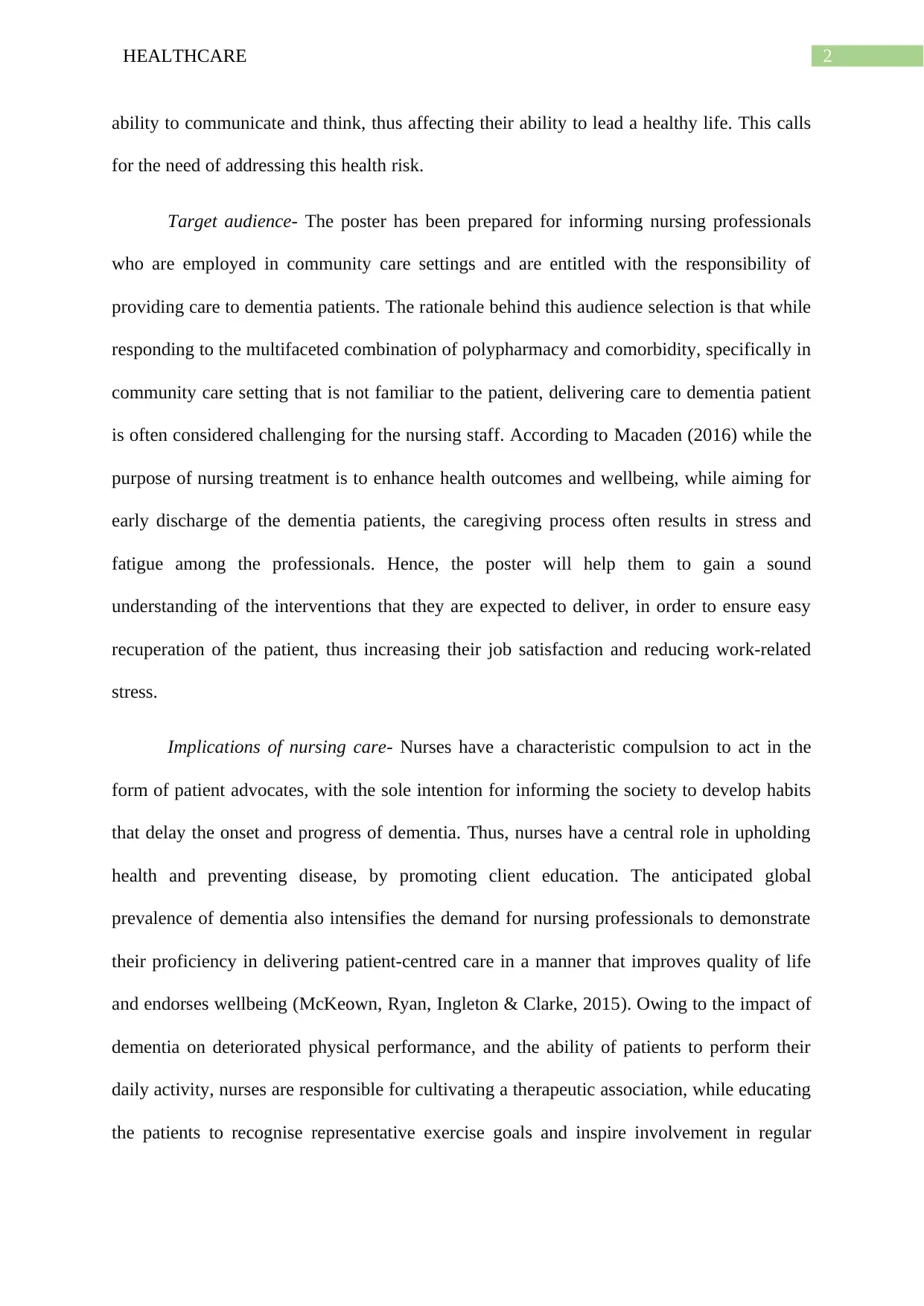
2HEALTHCARE
ability to communicate and think, thus affecting their ability to lead a healthy life. This calls
for the need of addressing this health risk.
Target audience- The poster has been prepared for informing nursing professionals
who are employed in community care settings and are entitled with the responsibility of
providing care to dementia patients. The rationale behind this audience selection is that while
responding to the multifaceted combination of polypharmacy and comorbidity, specifically in
community care setting that is not familiar to the patient, delivering care to dementia patient
is often considered challenging for the nursing staff. According to Macaden (2016) while the
purpose of nursing treatment is to enhance health outcomes and wellbeing, while aiming for
early discharge of the dementia patients, the caregiving process often results in stress and
fatigue among the professionals. Hence, the poster will help them to gain a sound
understanding of the interventions that they are expected to deliver, in order to ensure easy
recuperation of the patient, thus increasing their job satisfaction and reducing work-related
stress.
Implications of nursing care- Nurses have a characteristic compulsion to act in the
form of patient advocates, with the sole intention for informing the society to develop habits
that delay the onset and progress of dementia. Thus, nurses have a central role in upholding
health and preventing disease, by promoting client education. The anticipated global
prevalence of dementia also intensifies the demand for nursing professionals to demonstrate
their proficiency in delivering patient-centred care in a manner that improves quality of life
and endorses wellbeing (McKeown, Ryan, Ingleton & Clarke, 2015). Owing to the impact of
dementia on deteriorated physical performance, and the ability of patients to perform their
daily activity, nurses are responsible for cultivating a therapeutic association, while educating
the patients to recognise representative exercise goals and inspire involvement in regular
ability to communicate and think, thus affecting their ability to lead a healthy life. This calls
for the need of addressing this health risk.
Target audience- The poster has been prepared for informing nursing professionals
who are employed in community care settings and are entitled with the responsibility of
providing care to dementia patients. The rationale behind this audience selection is that while
responding to the multifaceted combination of polypharmacy and comorbidity, specifically in
community care setting that is not familiar to the patient, delivering care to dementia patient
is often considered challenging for the nursing staff. According to Macaden (2016) while the
purpose of nursing treatment is to enhance health outcomes and wellbeing, while aiming for
early discharge of the dementia patients, the caregiving process often results in stress and
fatigue among the professionals. Hence, the poster will help them to gain a sound
understanding of the interventions that they are expected to deliver, in order to ensure easy
recuperation of the patient, thus increasing their job satisfaction and reducing work-related
stress.
Implications of nursing care- Nurses have a characteristic compulsion to act in the
form of patient advocates, with the sole intention for informing the society to develop habits
that delay the onset and progress of dementia. Thus, nurses have a central role in upholding
health and preventing disease, by promoting client education. The anticipated global
prevalence of dementia also intensifies the demand for nursing professionals to demonstrate
their proficiency in delivering patient-centred care in a manner that improves quality of life
and endorses wellbeing (McKeown, Ryan, Ingleton & Clarke, 2015). Owing to the impact of
dementia on deteriorated physical performance, and the ability of patients to perform their
daily activity, nurses are responsible for cultivating a therapeutic association, while educating
the patients to recognise representative exercise goals and inspire involvement in regular
⊘ This is a preview!⊘
Do you want full access?
Subscribe today to unlock all pages.

Trusted by 1+ million students worldwide
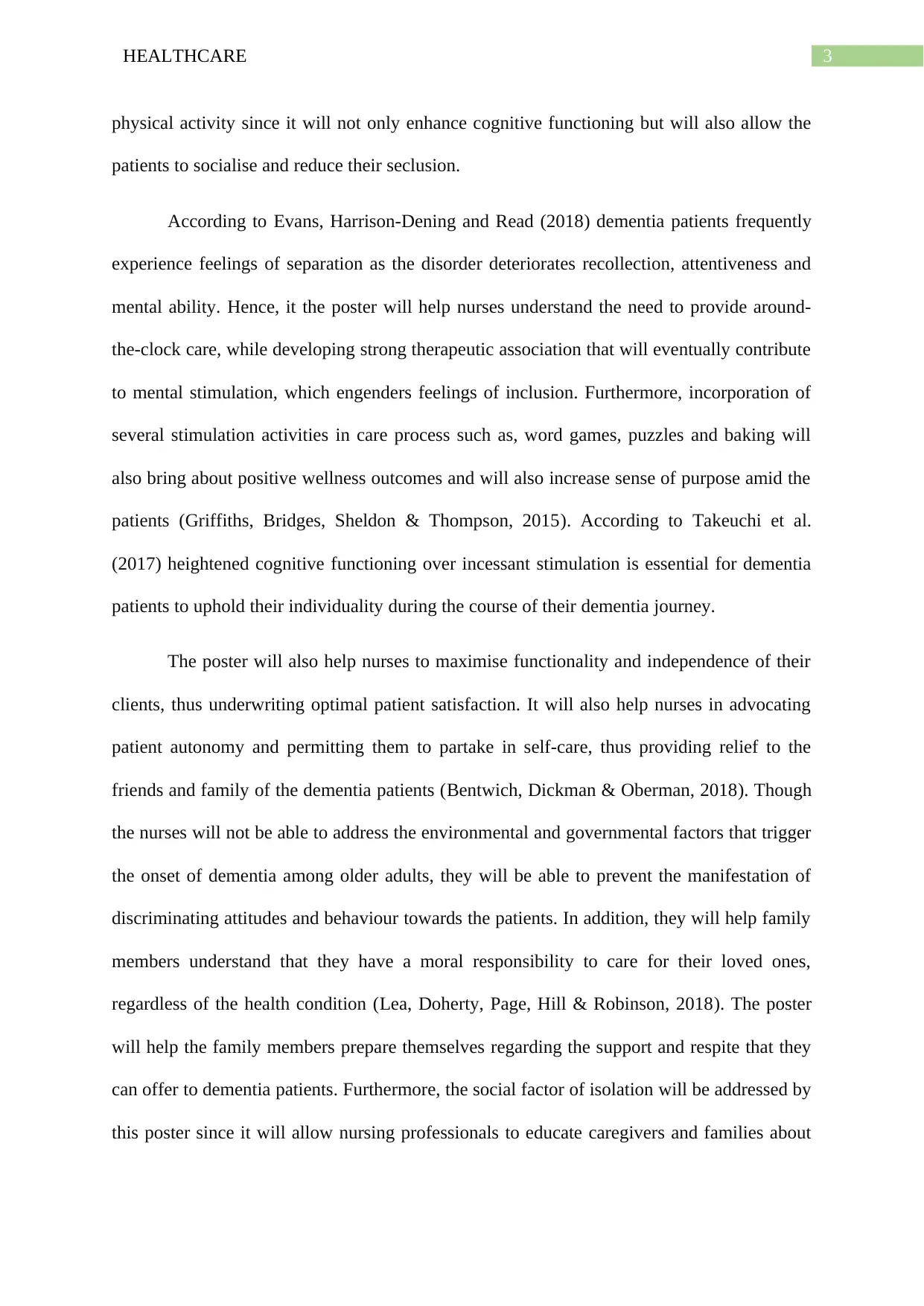
3HEALTHCARE
physical activity since it will not only enhance cognitive functioning but will also allow the
patients to socialise and reduce their seclusion.
According to Evans, Harrison-Dening and Read (2018) dementia patients frequently
experience feelings of separation as the disorder deteriorates recollection, attentiveness and
mental ability. Hence, it the poster will help nurses understand the need to provide around-
the-clock care, while developing strong therapeutic association that will eventually contribute
to mental stimulation, which engenders feelings of inclusion. Furthermore, incorporation of
several stimulation activities in care process such as, word games, puzzles and baking will
also bring about positive wellness outcomes and will also increase sense of purpose amid the
patients (Griffiths, Bridges, Sheldon & Thompson, 2015). According to Takeuchi et al.
(2017) heightened cognitive functioning over incessant stimulation is essential for dementia
patients to uphold their individuality during the course of their dementia journey.
The poster will also help nurses to maximise functionality and independence of their
clients, thus underwriting optimal patient satisfaction. It will also help nurses in advocating
patient autonomy and permitting them to partake in self-care, thus providing relief to the
friends and family of the dementia patients (Bentwich, Dickman & Oberman, 2018). Though
the nurses will not be able to address the environmental and governmental factors that trigger
the onset of dementia among older adults, they will be able to prevent the manifestation of
discriminating attitudes and behaviour towards the patients. In addition, they will help family
members understand that they have a moral responsibility to care for their loved ones,
regardless of the health condition (Lea, Doherty, Page, Hill & Robinson, 2018). The poster
will help the family members prepare themselves regarding the support and respite that they
can offer to dementia patients. Furthermore, the social factor of isolation will be addressed by
this poster since it will allow nursing professionals to educate caregivers and families about
physical activity since it will not only enhance cognitive functioning but will also allow the
patients to socialise and reduce their seclusion.
According to Evans, Harrison-Dening and Read (2018) dementia patients frequently
experience feelings of separation as the disorder deteriorates recollection, attentiveness and
mental ability. Hence, it the poster will help nurses understand the need to provide around-
the-clock care, while developing strong therapeutic association that will eventually contribute
to mental stimulation, which engenders feelings of inclusion. Furthermore, incorporation of
several stimulation activities in care process such as, word games, puzzles and baking will
also bring about positive wellness outcomes and will also increase sense of purpose amid the
patients (Griffiths, Bridges, Sheldon & Thompson, 2015). According to Takeuchi et al.
(2017) heightened cognitive functioning over incessant stimulation is essential for dementia
patients to uphold their individuality during the course of their dementia journey.
The poster will also help nurses to maximise functionality and independence of their
clients, thus underwriting optimal patient satisfaction. It will also help nurses in advocating
patient autonomy and permitting them to partake in self-care, thus providing relief to the
friends and family of the dementia patients (Bentwich, Dickman & Oberman, 2018). Though
the nurses will not be able to address the environmental and governmental factors that trigger
the onset of dementia among older adults, they will be able to prevent the manifestation of
discriminating attitudes and behaviour towards the patients. In addition, they will help family
members understand that they have a moral responsibility to care for their loved ones,
regardless of the health condition (Lea, Doherty, Page, Hill & Robinson, 2018). The poster
will help the family members prepare themselves regarding the support and respite that they
can offer to dementia patients. Furthermore, the social factor of isolation will be addressed by
this poster since it will allow nursing professionals to educate caregivers and families about
Paraphrase This Document
Need a fresh take? Get an instant paraphrase of this document with our AI Paraphraser
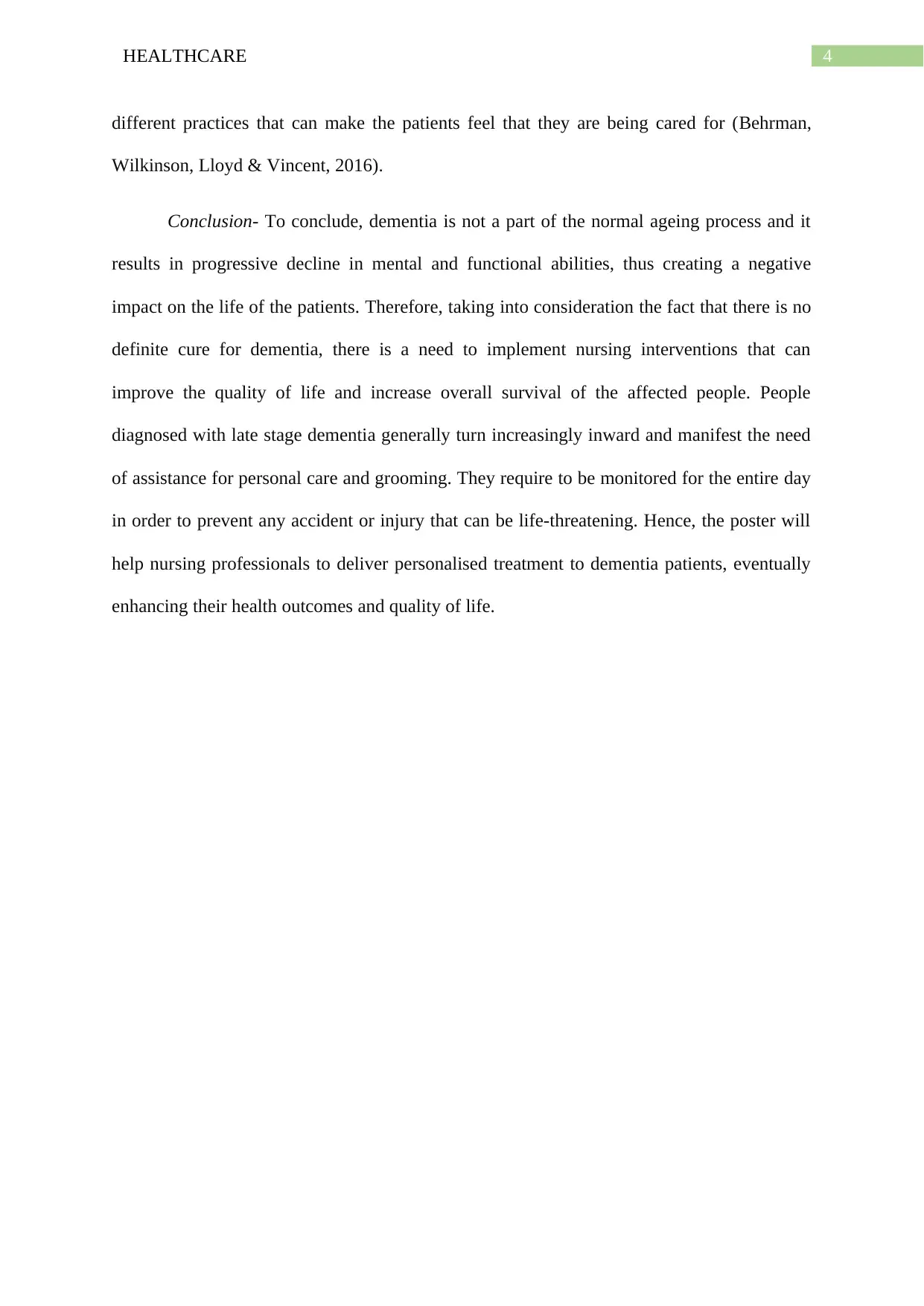
4HEALTHCARE
different practices that can make the patients feel that they are being cared for (Behrman,
Wilkinson, Lloyd & Vincent, 2016).
Conclusion- To conclude, dementia is not a part of the normal ageing process and it
results in progressive decline in mental and functional abilities, thus creating a negative
impact on the life of the patients. Therefore, taking into consideration the fact that there is no
definite cure for dementia, there is a need to implement nursing interventions that can
improve the quality of life and increase overall survival of the affected people. People
diagnosed with late stage dementia generally turn increasingly inward and manifest the need
of assistance for personal care and grooming. They require to be monitored for the entire day
in order to prevent any accident or injury that can be life-threatening. Hence, the poster will
help nursing professionals to deliver personalised treatment to dementia patients, eventually
enhancing their health outcomes and quality of life.
different practices that can make the patients feel that they are being cared for (Behrman,
Wilkinson, Lloyd & Vincent, 2016).
Conclusion- To conclude, dementia is not a part of the normal ageing process and it
results in progressive decline in mental and functional abilities, thus creating a negative
impact on the life of the patients. Therefore, taking into consideration the fact that there is no
definite cure for dementia, there is a need to implement nursing interventions that can
improve the quality of life and increase overall survival of the affected people. People
diagnosed with late stage dementia generally turn increasingly inward and manifest the need
of assistance for personal care and grooming. They require to be monitored for the entire day
in order to prevent any accident or injury that can be life-threatening. Hence, the poster will
help nursing professionals to deliver personalised treatment to dementia patients, eventually
enhancing their health outcomes and quality of life.
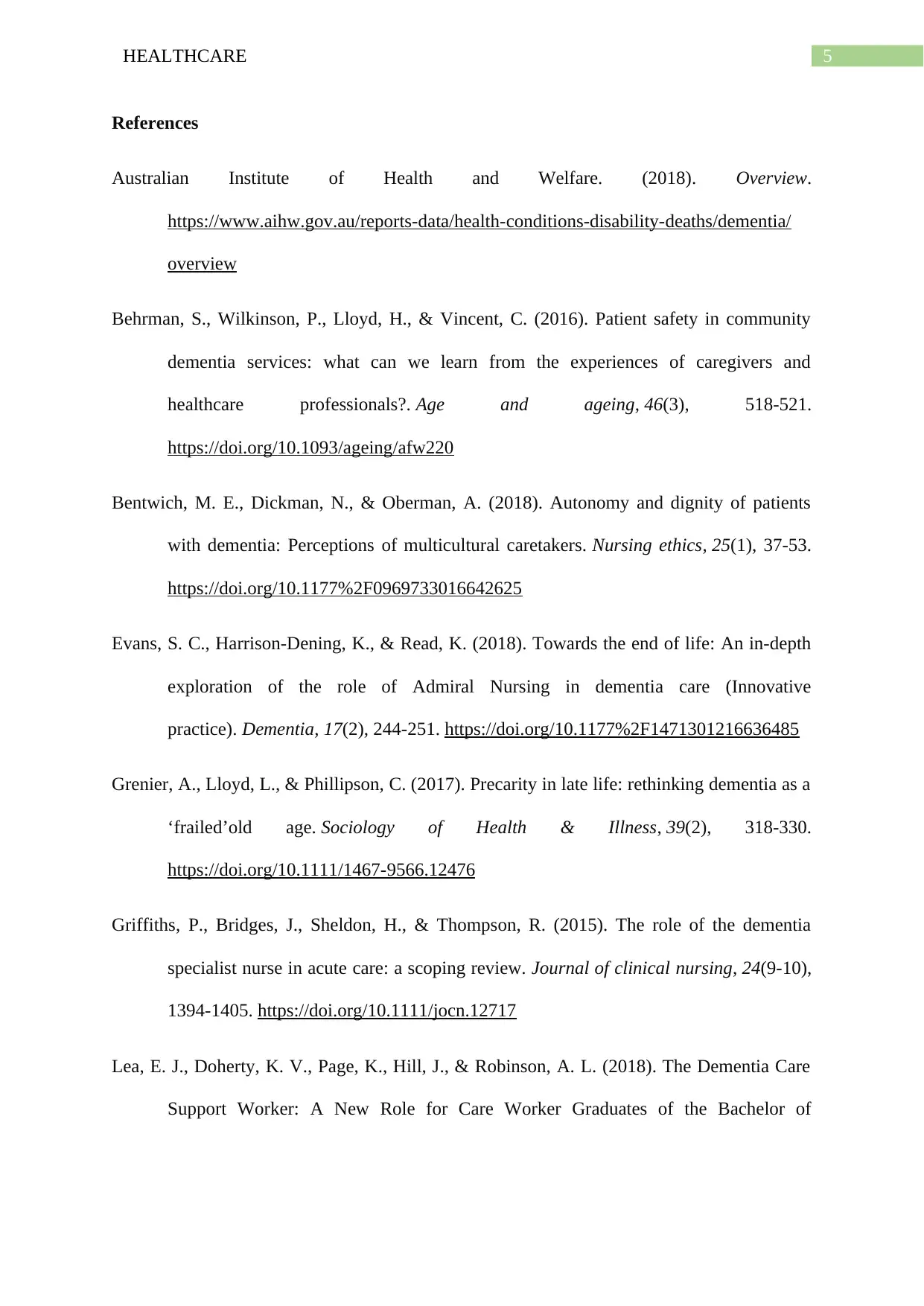
5HEALTHCARE
References
Australian Institute of Health and Welfare. (2018). Overview.
https://www.aihw.gov.au/reports-data/health-conditions-disability-deaths/dementia/
overview
Behrman, S., Wilkinson, P., Lloyd, H., & Vincent, C. (2016). Patient safety in community
dementia services: what can we learn from the experiences of caregivers and
healthcare professionals?. Age and ageing, 46(3), 518-521.
https://doi.org/10.1093/ageing/afw220
Bentwich, M. E., Dickman, N., & Oberman, A. (2018). Autonomy and dignity of patients
with dementia: Perceptions of multicultural caretakers. Nursing ethics, 25(1), 37-53.
https://doi.org/10.1177%2F0969733016642625
Evans, S. C., Harrison-Dening, K., & Read, K. (2018). Towards the end of life: An in-depth
exploration of the role of Admiral Nursing in dementia care (Innovative
practice). Dementia, 17(2), 244-251. https://doi.org/10.1177%2F1471301216636485
Grenier, A., Lloyd, L., & Phillipson, C. (2017). Precarity in late life: rethinking dementia as a
‘frailed’old age. Sociology of Health & Illness, 39(2), 318-330.
https://doi.org/10.1111/1467-9566.12476
Griffiths, P., Bridges, J., Sheldon, H., & Thompson, R. (2015). The role of the dementia
specialist nurse in acute care: a scoping review. Journal of clinical nursing, 24(9-10),
1394-1405. https://doi.org/10.1111/jocn.12717
Lea, E. J., Doherty, K. V., Page, K., Hill, J., & Robinson, A. L. (2018). The Dementia Care
Support Worker: A New Role for Care Worker Graduates of the Bachelor of
References
Australian Institute of Health and Welfare. (2018). Overview.
https://www.aihw.gov.au/reports-data/health-conditions-disability-deaths/dementia/
overview
Behrman, S., Wilkinson, P., Lloyd, H., & Vincent, C. (2016). Patient safety in community
dementia services: what can we learn from the experiences of caregivers and
healthcare professionals?. Age and ageing, 46(3), 518-521.
https://doi.org/10.1093/ageing/afw220
Bentwich, M. E., Dickman, N., & Oberman, A. (2018). Autonomy and dignity of patients
with dementia: Perceptions of multicultural caretakers. Nursing ethics, 25(1), 37-53.
https://doi.org/10.1177%2F0969733016642625
Evans, S. C., Harrison-Dening, K., & Read, K. (2018). Towards the end of life: An in-depth
exploration of the role of Admiral Nursing in dementia care (Innovative
practice). Dementia, 17(2), 244-251. https://doi.org/10.1177%2F1471301216636485
Grenier, A., Lloyd, L., & Phillipson, C. (2017). Precarity in late life: rethinking dementia as a
‘frailed’old age. Sociology of Health & Illness, 39(2), 318-330.
https://doi.org/10.1111/1467-9566.12476
Griffiths, P., Bridges, J., Sheldon, H., & Thompson, R. (2015). The role of the dementia
specialist nurse in acute care: a scoping review. Journal of clinical nursing, 24(9-10),
1394-1405. https://doi.org/10.1111/jocn.12717
Lea, E. J., Doherty, K. V., Page, K., Hill, J., & Robinson, A. L. (2018). The Dementia Care
Support Worker: A New Role for Care Worker Graduates of the Bachelor of
⊘ This is a preview!⊘
Do you want full access?
Subscribe today to unlock all pages.

Trusted by 1+ million students worldwide
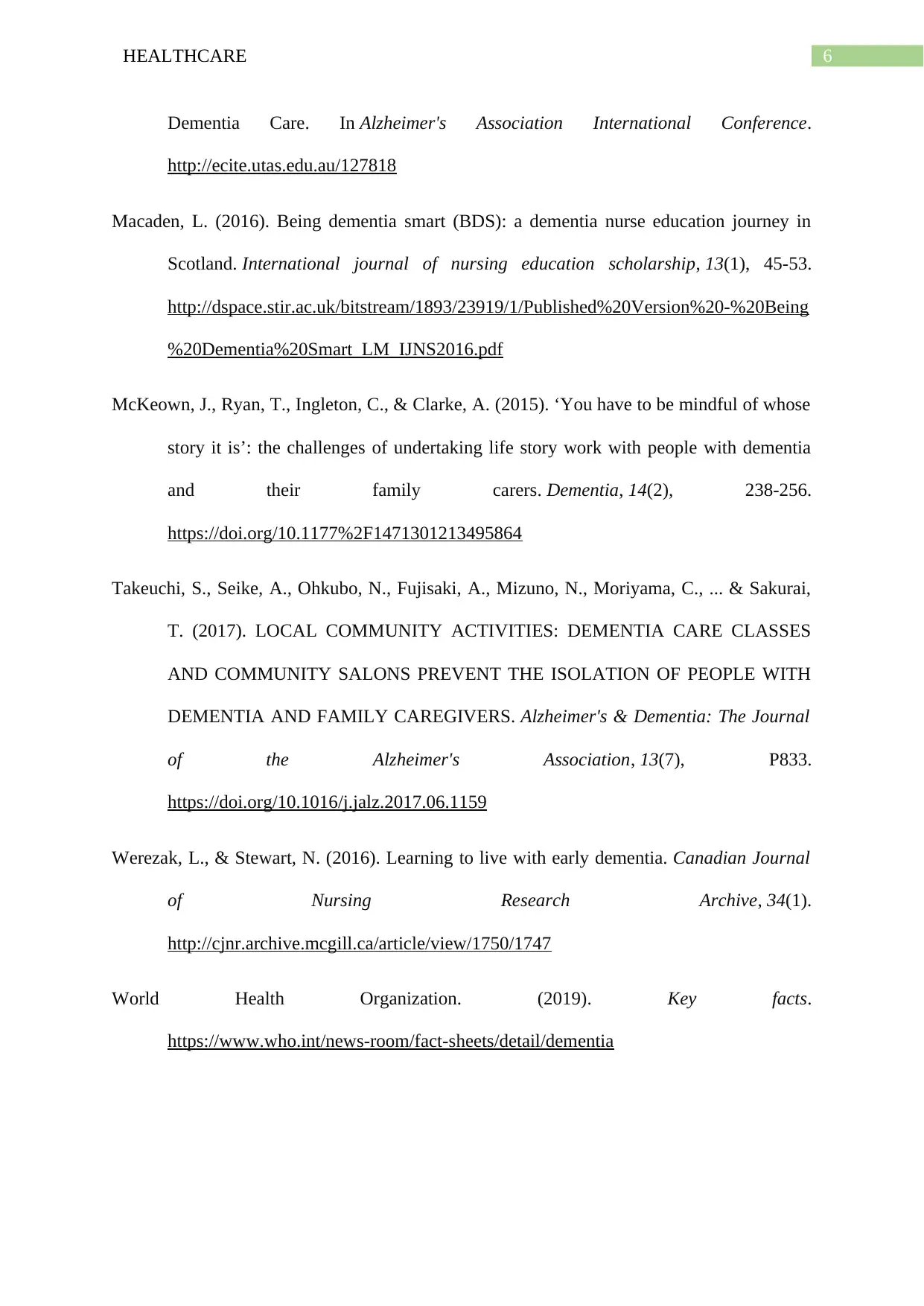
6HEALTHCARE
Dementia Care. In Alzheimer's Association International Conference.
http://ecite.utas.edu.au/127818
Macaden, L. (2016). Being dementia smart (BDS): a dementia nurse education journey in
Scotland. International journal of nursing education scholarship, 13(1), 45-53.
http://dspace.stir.ac.uk/bitstream/1893/23919/1/Published%20Version%20-%20Being
%20Dementia%20Smart_LM_IJNS2016.pdf
McKeown, J., Ryan, T., Ingleton, C., & Clarke, A. (2015). ‘You have to be mindful of whose
story it is’: the challenges of undertaking life story work with people with dementia
and their family carers. Dementia, 14(2), 238-256.
https://doi.org/10.1177%2F1471301213495864
Takeuchi, S., Seike, A., Ohkubo, N., Fujisaki, A., Mizuno, N., Moriyama, C., ... & Sakurai,
T. (2017). LOCAL COMMUNITY ACTIVITIES: DEMENTIA CARE CLASSES
AND COMMUNITY SALONS PREVENT THE ISOLATION OF PEOPLE WITH
DEMENTIA AND FAMILY CAREGIVERS. Alzheimer's & Dementia: The Journal
of the Alzheimer's Association, 13(7), P833.
https://doi.org/10.1016/j.jalz.2017.06.1159
Werezak, L., & Stewart, N. (2016). Learning to live with early dementia. Canadian Journal
of Nursing Research Archive, 34(1).
http://cjnr.archive.mcgill.ca/article/view/1750/1747
World Health Organization. (2019). Key facts.
https://www.who.int/news-room/fact-sheets/detail/dementia
Dementia Care. In Alzheimer's Association International Conference.
http://ecite.utas.edu.au/127818
Macaden, L. (2016). Being dementia smart (BDS): a dementia nurse education journey in
Scotland. International journal of nursing education scholarship, 13(1), 45-53.
http://dspace.stir.ac.uk/bitstream/1893/23919/1/Published%20Version%20-%20Being
%20Dementia%20Smart_LM_IJNS2016.pdf
McKeown, J., Ryan, T., Ingleton, C., & Clarke, A. (2015). ‘You have to be mindful of whose
story it is’: the challenges of undertaking life story work with people with dementia
and their family carers. Dementia, 14(2), 238-256.
https://doi.org/10.1177%2F1471301213495864
Takeuchi, S., Seike, A., Ohkubo, N., Fujisaki, A., Mizuno, N., Moriyama, C., ... & Sakurai,
T. (2017). LOCAL COMMUNITY ACTIVITIES: DEMENTIA CARE CLASSES
AND COMMUNITY SALONS PREVENT THE ISOLATION OF PEOPLE WITH
DEMENTIA AND FAMILY CAREGIVERS. Alzheimer's & Dementia: The Journal
of the Alzheimer's Association, 13(7), P833.
https://doi.org/10.1016/j.jalz.2017.06.1159
Werezak, L., & Stewart, N. (2016). Learning to live with early dementia. Canadian Journal
of Nursing Research Archive, 34(1).
http://cjnr.archive.mcgill.ca/article/view/1750/1747
World Health Organization. (2019). Key facts.
https://www.who.int/news-room/fact-sheets/detail/dementia
1 out of 7
Related Documents
Your All-in-One AI-Powered Toolkit for Academic Success.
+13062052269
info@desklib.com
Available 24*7 on WhatsApp / Email
![[object Object]](/_next/static/media/star-bottom.7253800d.svg)
Unlock your academic potential
Copyright © 2020–2026 A2Z Services. All Rights Reserved. Developed and managed by ZUCOL.




